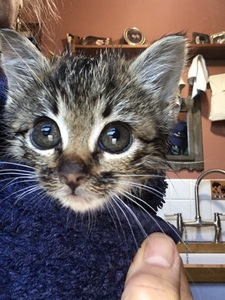Introduce additional measures urgently to ensure responsible ownership and control of cats, which include compulsory neutering*, micro-chipping and registration of all owned cats.
* a licensed exemption to keep un-neutered cats would promote and develop responsible breeding.
Why is this important?
Many awful things happen to cats and kittens living rough. Few of us witness their suffering and deaths.
100's of thousands of cats endure atrocious conditions because owned cats still produce far more kittens than there are homes available. Kittens are born only to die young without knowing anything in their short lives but starvation and cold.
13% of owners in Scotland still keep their cats un-neutered - even if each female produces just one litter a year that's enough to double the cat population every four years. Those that are 'excess-to-requirements' leak out and swell the already extensive stray and feral cat populations. Some argue that this over-production of moggies is important to ensure adopters get a choice of kittens from a diverse "gene pool "- but that's a huge animal welfare issue! Is a high death rate after protracted suffering among innocent animals, homeless and feral through no fault of their own, an acceptable state in Scotland? I think you and I agree - it's not acceptable!
Hero's kittens were caught by the baler and crushed. Bonnie weakened by serial pregnancies was shot and took 2 days to crawl back to her kittens which had died. 15 homeless cats 'in the wrong place' were wiped out by poisoning.
Stray and feral cats and their offspring suffer disease, starvation, persecution and protracted deaths in dangerous environments. These cats are everywhere across Scotland, but avoid showing themselves and only when injured, ill or nursing kittens are they spotted by humans. I've caught and neutered 4,500 cats in the past two decades and could have done 10 times that number - they are just everywhere. Trap Neuter Return programmes have a local effect but that's lost as soon as the TNR finishes. New stronger measures are needed to protect domestic cats from the suffering that goes with being bred and traded in an unregulated way
The wildcat in Scotland has reached the edge of extinction largely through cross-breeding with cats of the domestic species (a middle eastern/ hot climate species). Nowhere in Scotland are wild cat ranges far from human activity which is where un-neutered cats of the domestic species come from.
If captive bred wildcat kittens are to survive they need an environment free from fertile cats of the domestic species, so they can thrive and extend into their natural ranges.
ID chipping combined with regulation of breeding for owned cats will both protect owned cats from preventable suffering and ensure space for the wildcat to thrive in Scotland. Win win!
Please SIGN THIS PETITION and SHARE.
Thank You - by SIGNING and SHARING you are helping to alleviate the suffering of Scotland's most vulnerable cats and kittens, and to give the Scottish wildcat a future.
QUESTIONS
Wouldn't this ban people from breeding cats?
No. On the contrary, there would be improved opportunities for responsible 'high welfare' breeders through education and inspection.
What's the legal position?
There's no need for new legislation. Measures could be introduced through the Code of Practice associated with the Wildlife and Natural Environment Scotland Act of 2011.
What's the impact on human rights?
Positive. The public will be able to adopt/buy pet and working cats from breeders whose welfare standards can be scrutinised. Microchipping is the most important thing that a person can do to ensure they are re-united with their cat if it does get lost. Neutering is the most important thing a person can do to protect their cat from getting into fights which is how they get infected with viruses.
What's the economic impact?
Some investment is likely to be needed at first to get compulsory neutering going. In the long term costs will go down permanently.
Won't people just refuse to cooperate?
There were similar worries about the ban on smoking in public places. Some people refused, but most complied, resulting in permanent widespread changes in attitudes and behaviour.
When you sign here that will be counted as support for the same Petition at present before the Petitions Committee in the Scottish Parliament.


